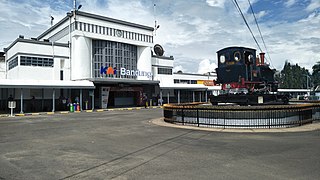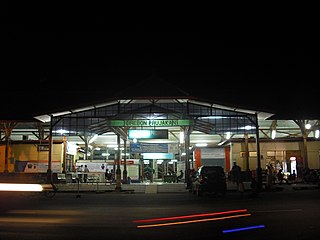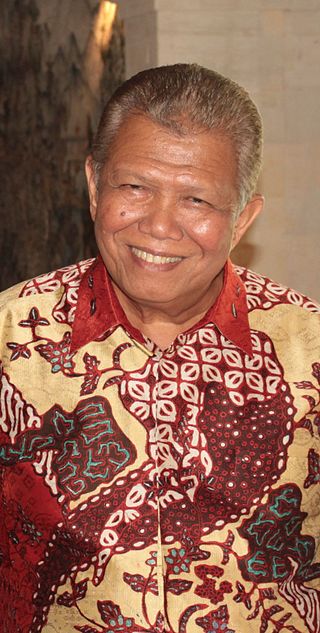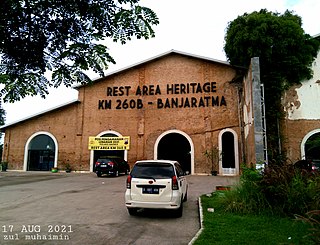Company
The name PT Perkebunan Nusantara is the name of a Perseroan Terbatas, abbreviated PT, a limited liability company under Indonesian law, which - under state ownership - is engaged in plantation cultivation. All of the large state-owned agricultural companies (Perkebunan Nusantara) in Indonesia are grouped into different departments according to their subject-matter and regional responsibilities. PTPN 9 is 90% owned by the Indonesian state through PT Perkebunan Nusantara III (Persero) Holding, and another 10% are directly owned by the state (Negara Kesatuan Republic of Indonesia). The share of PTPN III is estimated at 1.4 trillion Indonesian rupiah. [3]
Perkebunan means plantation and Nusantara is a synonym for the Indonesian archipelago or the national territory of Indonesia. PT PN 9 is to a third also co-owner of the Cepiring sugar factory (PG Tjepiring) in the Kendal district, which closed in 1997. That partially privatized sugar factory was newly reopened at the old location under the name of PT Industri Gula Nusantara (IGN), . [4] To a small extent, one is also co-owner of a research plantation (PT Riset Perkebunan Nusantara, share 6.67%) and a marketing company (PT Kharisma Pemasaran Bersama Nusantara, share 7.14%).
For its part, the company is divided into two business areas, on the one hand in the Annual Plant Division (DTT), which is dedicated to the cultivation and processing of rubber, coffee and tea, and on the other hand in the Plant Annuals (DTS) (sugar factory), the cultivation of sugar and manufacture of sugarcane products. [1]
In addition to fields of activity that have changed little at the locations of the factories since colonial rule, PTPN 9 also produces and markets ground coffee under the name Kampoeng Kopi Banaran, Kaligula tea and nutmeg syrup .
In 2018, about half of the total revenue of 530 billion Indonesian rupees (IDR) came from the cultivation and marketing of rubber. A quarter contributed the proceeds from the cultivation and processing of sugar cane. All other activities together achieved around 10% of the total result. [5]
For the cultivation of rubber you have your own usable plantations in an order of 19,000 hectares, while for tea and coffee there are only just under 1,000 hectares each. [6]
PTPN 9 includes the sugar factories (including the recently temporarily or permanently closed locations):
Slavi district - PG Pangka formerly PTP XV
Pemalang District - PG Sumberharjo formerly PTP XV, closed in 2016
Kudu District - PG Rendeng formerly PTP XV
Sragen District - PG Mojo
Karanganyar District - PG Tasikmadu formerly PTP XVI
Klaten District - PG Gondang Baru formerly PTP XVI, closed in 2017
Pekalongan District - PG Sragi formerly PTP XV
Brebes District - PG Jatibarang formerly PTP XV, closed in 2017
Furthermore, the 1997 with the end of the season closed sugar factories PG Kalibagor (belonging to theearlier PTP XVI company) in the district of Purwokerto, PG Banjaratma ( formerly PTP XV ) in the district of Tegal, PG Colomadu (formerly PTP XVI) in the district of Karanganyar, PG Cepiring (formerly PTP XV) in the Kendal district and PG Ceper Baru (formerly PTP XVI) in the Klaten district. For its works railway, which was closed in 2015, PG Sragi last used the still existing parts of facilities of the neighboring PG Comal, which was mostly destroyed in the Second World War. [7] [8]
PTPN 9 owns rubber plantations (kebun means garden) and factories for its processing at
Karanganyar District - Kebun Batujamus
Cilacap District - Kebun Warnasari and Kebung Kawung
Banyumas District - Kebun Krumbut
Pekalongan District - Kebun Blimbing
Batang District - Kebun Siluwok
District Kendal - Kebun Merbuh and im
Jepara District - Kebun Balong
Both rubber and coffee are grown at the facilities in Kendal District - Kebun Sukamangli and Semarang District - Kebun Getas and Kebun Ngobo.
The company owns another coffee plantation in the Pati - Kebun Jollong district.
There are tea plantations and factories in Brebes District - Kebun Kaligua and Pemalang - Kebun Semugih District.
There is also a mixed tea and rubber plant in the Pekalongan - Kebun Jolotigo district.
In addition to its core business, PTPN 9 also operates the so-called agrotourism in the Kampoeng Kopi Banaran amusement park at the Getas Afdeling Assinan coffee plantation on the Semarang - Salatiga road near Bawen. A facility with a coffee house, swimming pool, conference rooms and sports facilities. In the complex is also the Banaran 9 Resort with various accommodations and conference rooms with a view of the Rawa Pening Lake and the Gunung Ungaran volcano. At the sugar factory PG Gondang Baru (Gondang Winangoen) a sugar museum and a coffee house were built in 1982. With the former sugar cane railways at PG Gongang Baru, PG Jatibarang, PG Pangka, PG Sumberharjo as well as PG Tasikmadu, you can still drive on a circular route at the factories area. The field lines for railways are close everywhere. [9] [10] [11] [12] [13]














